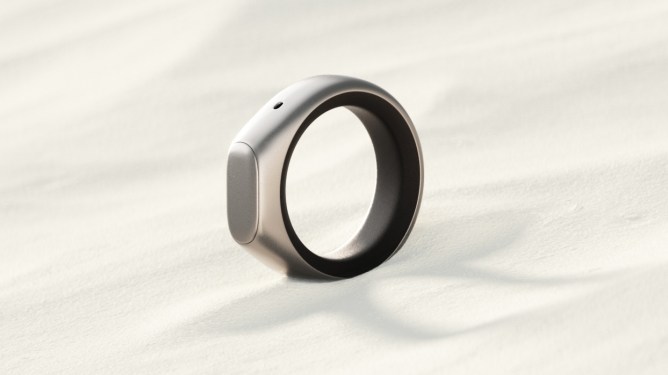A variety of voice-based hardware devices have emerged, aimed at companionship, productivity, or personal growth. These include card-shaped devices from Plaud and Pocket, pendants from Friend, Limitless, and Taya, and a wristband from Bee, which is now part of Amazon.
Now, two former Meta employees who worked on interface design have launched Sandbar, a startup that has created a ring called Stream for similar purposes. The company calls the ring a mouse for voice because it can take notes, help you interact with an AI assistant, and also let you control music.
Sandbar’s CEO, Mina Fahmi, has an extensive background in designing human-computer interfaces. He worked at Bryan Johnson’s Kernel and later at smart glasses startup Magic Leap. Kirak Hong, Sandbar’s CTO, worked at Google before joining CTRL-Labs, where the duo met. Meta acquired the startup in 2019, and its work eventually led to neural interfaces for the tech giant’s smart wearables.
Fahmi said that when large language models started emerging a few years ago, he built an experimental journaling app. However, he found that the app itself became a barrier to capturing his thoughts. Given his experience building hardware interfaces, he began exploring a conversational hardware interface instead.
He explained that many of his ideas surface when he is walking or commuting, and he does not want to pull out his phone and interrupt that moment. He also does not want to shout into his earbuds where the world can hear him talk through an idea. He and Kirak Hong were trying to understand what it would take to capture a thought the moment it bubbles up, which is how they conceived of Stream.
The ring is designed to be worn on your dominant hand’s index finger and contains microphones and a touch pad. In a virtual demo, Fahmi wore the Stream ring and recorded his thoughts by pressing and holding the touchpad. By default, the microphone is off, activating only with this gesture. The microphone proved sensitive enough to pick up whispers and transcribe them in the companion iOS app. Other apps like Wispr Flow and Willow similarly allow people to capture their thoughts quietly.
Stream’s app includes an AI chatbot that converses with you as you record your thoughts. You can organize these into separate notes that either you or the AI can edit. The app also lets you pinch to zoom out and review what you have discussed over days or weeks. Sandbar has added a personalization layer so the assistant’s voice sounds somewhat similar to the user’s.
Fahmi said that in crowded spaces, users can wear headphones to converse privately with the assistant. Without headphones, the ring provides haptic feedback when it successfully registers a note, allowing you to add to-dos, take notes, or check items off a grocery list quietly.
Beyond voice functions, the ring’s flat surface doubles as a media controller, allowing you to play, pause, skip tracks, and adjust volume. While many headphones offer similar controls, the ring could prove useful when your hands are occupied or you are in transit.
The company is opening pre-orders for Stream at two hundred forty-nine dollars for the silver version and two hundred ninety-nine dollars for gold. Sandbar aims to begin shipping next summer. A Pro subscription tier, free for three months for those who preorder and then ten dollars per month, offers unlimited chats, notes, and early access to new features.
Fahmi said the company gives users full control over their data at any tier, with encryption both at rest and in transit. He added that Sandbar does not believe in walled gardens and plans to support data exports to apps like Notion. Sandbar has raised thirteen million dollars in funding from True Ventures, Upfront Ventures, and Betaworks.
Toni Schneider, a partner at True Ventures, said he had been skeptical of AI devices, as demos he had seen before Stream were not impressive. He stated that many people agree voice and AI go well together and that using a phone or laptop to interact with AI can be excessive when all you need is voice. He believes there should be a new form factor and that while many were examined, they did not quite hit the target. When Mina Fahmi demonstrated Stream, it made immediate sense.
Competition is fierce in the voice-AI hardware space, with many builders exploring rings as a form factor. Fahmi said he does not want Stream to be an assistant or a companion, but rather an interface for users to express their ideas while maintaining full control.
AI hardware has yet to achieve mainstream success. Humane sold to HP, Rabbit is attempting to improve user experience and engagement through software updates, and Friend is trying to leverage user backlash to fuel growth. Sandbar will need to prove that its ring form factor offers genuine convenience and value that pendants, pins, or wristbands cannot.

